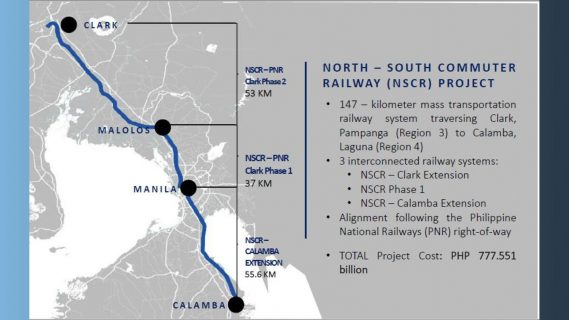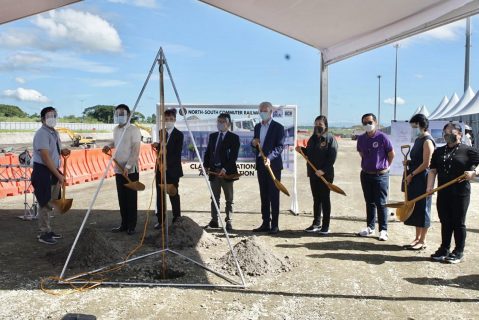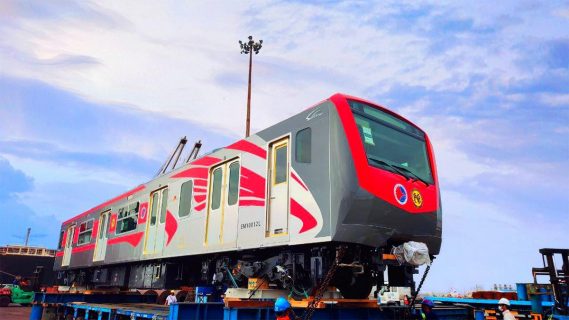The construction of the North-South Commuter Railway (NSCR) from Tutuban to Malolos is set to begin. This is after the Department of Transportation (DoTr) issued a notice to Hitachi Rail S.T.S. SpA to proceed with the works.
The works include the installation of electrical and mechanical systems as well as track laying. The works will be carried out in accordance with item 8.1(c) section VIII of the Particular Conditions of the Contract valued at US$ 153.88M.
The rail project from Tutuban to Malolos is co-financed by the Japan International Cooperation Agency and the Asian Development Bank. Under the notice, Hitachi Rail was asked to mobilize, deliver an advance payment security, and submit an invoice for advance payment upon receipt of the notice.
Other contracts awarded for the NSCRP Project
In addition to the CP S-04 awarded to Hitachi, the government of the Asian country signed additional contracts for the NSCRP project.
The contracts include the South Commuter Section Contract Packages (CP) S-02 and CP S-03B. The former covers the construction of railway tracks and stations along España, Sta. Mesa and Paco. The latter on the other hand involves building a tunnel linking the NSCR with the Metro Manila Subway Project.
CP S-02, which is worth almost P29 billion, was awarded to Acciona Construction Philippines Inc. and D.M. Consunji Inc. The P23.92 billion CP S-03B on the other hand was awarded to First Balfour Inc. and Leighton Asia.
Project Overview
The North-South Commuter Railway in the Philippines (NSCR), also known as the Clark–Calamba Railway, is a 148-kilometer urban rail transit system currently under construction on the island of Luzon, Philippines, primarily in the Greater Manila Area.
The project comprises two components, the first of which is a 653km including 478km mainline and 175km extension, long-haul passenger rail line from Tutuban, Manila, to Legazpi, Bicol, with possible extensions from Calamba, Laguna, to Batangas City a distance of 58km, and from Legazpi, Albay, to Matnog, Sorsogon a distance of 117km.
The second component includes a 56km commuter rail line or the NSCR for daily riders on the Tutuban, Manila to Calamba, Laguna route with two additional sections including the 38km PNR Clark Phase One from Tutuban to Malolos, and the 53km PNR Clark Phase two from Malolos to Clark.
The entire route will have a total of 36 stations.

Scope of the project
The North-South Railway Project includes restoration and renovation of the existing track for safe use, as well as upgrades for attaining a design speed of 75km/h and allowing a maximum permissible axle load of 15t.
It will also include the repair and replacement of more than 420 bridges, the development of 15 stations and three depots, and the installation of electromechanical, signaling, communication, and automatic fare collection systems.
The new line will be served by diesel-powered multiple-unit rolling stock that will constitute 14 electric multiple-unit-based, eight-car trains, which will be increased to 32 by the year 2044.
North-South Commuter Railway in the Philippines Project team
The US$ 15.8bn North-South Railway Project is developed jointly by the Philippines’ Department of Transportation (DOTr) and Philippines National Railways (PNR) with subsidies from the Asian Development Bank (ADB) and the Development Bank of the Philippines (DBP), Japan International Cooperation Agency (JICA), and Export-Import Bank of China.
CPCS Transcom (CPCS) is acting as the lead transaction advisor and will also conduct pre-investment studies to assess feasibility, structure the project as a PPP, and provide support during the tender and negotiation processes.
Oriental Consultants Global and SMEC are the general consultants for phase one of the project to provide detailed design and manage and supervise construction.

Taisei Corporation and D.M. Consunji joint venture are undertaking the construction of the first package of phase one of the commuter rail, while the second package will be carried out by a consortium of Sumitomo-Mitsui Construction.
NSTren Consortium is the construction supervision consultant for phase one of the project.
Sumitomo Corporation will supply 104 train sets for phase one of the commuter rail by February 2023.
Project Timeline
2015
The North-South Railway Project was approved by the National Economic and Development Agency (NEDA) Board in February 2015.
2018
In January, the pre-construction work such as clearing of the right of way for the project began.
2019
The groundbreaking ceremony for the project, starting with PNR Clark Phase One, was held in February and the actual construction work started right after.
2020
In August, the Department of Transportation (DOTr) in the Philippines awarded two civil works contracts, worth around US $728m in total for the project.
DOTr awarded the first contract to the Acciona Construction Philippines and EEI Corporation joint venture (JV) for the construction of 6.3 km-long main railway lines and 1.6km of the depot access line. The scope of the contract also includes the construction of an underground railway station at Clark International Airport.
The second contract was awarded to POSCO Engineering and Construction to build a 33-ha depot, as well as a railway operations control center in Mabalacat. The DOTr is expected to award three more civil works contracts later this year.
In late September, the consortium of Megawide Construction Corp. (Megawide) and it’s Korean partners Hyundai Engineering & Construction Co. Ltd. and Dong-ah Geological Engineering Company Ltd. bagged a 17km segment of the Malolos-Clark Railway Project (MCRP) for an estimated project value of US $577.5m.
In early October, the Department of Transportation (DOTr) awarded three more civil works contracts worth more than US $1.7bn; with construction expected to start soon.
Daelim Industrial announced on Oct. 8th that it has signed a contract to construct the second section of the Malolos-Clark Railway Project (MCRP) ordered by the Philippine Ministry of Transportation.
The total construction cost is US $616.97m, and Daelim will jointly carry out the project with Acciona, a Spanish construction company, by establishing a joint venture. The stake for Daelim Industrial is 50%, which is worth about US $316.1m.
2021
In early January, the City Government of San Fernando headed by Mayor Edwin Santiago stepped up its preparation for the construction of the Malolos-Clark Railway Project as officials met with representatives from the Department of Transportation (DOTr), Philippine National Railways (PNR), and two private contractors at Heroes Hall.
Santiago, together with some City Government department heads and barangay officials held a dialogue with the DOTr, PNR, and project contractors—the Italian-Thai Development Public Company Limited and ACCIONA Construction Philippines/Daelim Industrial.
The said public and private agencies would both construct railway viaducts, including suspension bridges, cantilever bridges, and station buildings in key locations in San Fernando.
Part of the 53.1km railway project that connects Malolos, Bulacan with Clark Freeport Zone and Clark International Airport will be constructed within San Fernando. Also tackled during the meeting were the processes for the issuance of different permits for the contractors prior to the actual construction set early this year.
This same month, the 54-kilometer PNR Clark Phase 2 segment, which will run from Malolos in Bulacan to Clark in Pampanga, was reportedly 27.79% complete. The pre-construction activities for the project such as site inspections at the Clark International Airport (CRK) and Apalit Station were ongoing.
The construction of the North-South Commuter Railway Extension particularly the PNR Clark Phase Two which upon completion will deliver the Southeast Asia country’s first airport railway express service, began in September.
In mid-February, the Department of Transportation (DOTr) announced the start of the Philippine National Railways (PNR) Clark Phase 2 project, which will run from Malolos town in Bulacan province to the freeport.
According to the department the much-awaited second leg of the mammoth North-South Commuter Railway (NSCR) project, co-implemented by the Department of Transportation and the Philippine National Railways is now moving at a very rapid pace.
In early March, the government asked for bids from Japanese suppliers for the contract to supply train sets for the Malolos-Clark Railway Project and the North-South Railway Project-South Commuter line.
“The Department of Transportation (DoTr)… through its procuring agent, the Procurement Service (PS), now invites sealed bids in a single stage (without prequalification) two-envelope (technical and financial) from eligible bidders for the procurement of the train sets,” the department announced.
The contract involves the design, manufacture, supply, installation, testing, commission, integration, and technical support for “seven-unit eight-car train sets.” The contract will be funded from the proceeds of a loan provided by the Japan International Cooperation Agency (JICA), which was signed on Jan. 21, 2019.
In mid-April, it was reported that Megawide Construction Corporation is preparing to start construction for phase 1 of the Malolos-Clark Railway (MCR) project in the second quarter of the year.
In early May, Megawide Construction Corp announced that it has signed an agreement with joint venture partners to supply ready-mix concrete for the construction of the Philippine National Railways Clark Phase 2 or the Malolos-Clark railway project package 1.

In October, DOTr announced that the first train set for the PNR Clark Phase 1 was undergoing factory acceptance testing (FAT) in Japan to ensure that it meets its “intended purpose” and complies with international standards such as the International Organization of Standardization (ISO) and Japanese Industrial Standards (JIS), prior to its delivery.
November 2021
The Department of Transportation signed an agreement with NLEX Corporation over the construction of columns for the PNR Clark Phase 2 Project. Under the agreement, columns for PNR Clark will be constructed in the shoulders and median island that will cross above the Subic-Clark-Tarlac Expressway to allow seamless operations of both the expressway and the railway.
The DOTR and NLEX will also coordinate the project design, traffic management plan, safety plan, and security plan.
November 2021
DOTr announced that the first of the 13 rolling stock sets procured from the Japan Transport Company and Sumitomo Corporation Joint Venture for PNR Clark Phase 1, had arrived in the Philippines.

The rolling stock, which is the same as the eight-car train set that underwent testing in Japan back in October 2021, has passed factory acceptance tests and is already at the Port of Manila. It will be transferred to the Philippine National Railways depot in Malanday next month (December 2021) after the shipment has cleared customs.
According to DOTr, the second set will be delivered by the second quarter of next year (2021).
The Transportation Department announced that Bocaue and Balagtas Stations on PNR Clark Phase 1 had achieved an overall progress rate of 23.18% and 23.97% respectively and they were expected to start partial operations by October 2022.
The department projected that all 10 stations in the PNR Clark Phase 1 could be completed in less than two years, as well as the six stations for the 53-kilometer PNR Clark Phase 2 from Malolos to Clark International Airport.
Goddess Hope Libiran, the Assistant Secretary said that the entire PNR Clark 1 project was 51.30% complete explaining that this progress rate includes not just the 10 stations but also the viaducts and the girders, and other components of the project.
March 2022
DOTr to purchase 304 Commuter Railway Train Cars for use on North-South Commuter Railway (NSCR) project.
The Department of Transportation (DOTr) recently announced that it had signed a contract for the purchase of 304 more Commuter Railway Train Cars for use on the North-South Commuter Railway (NSCR) project.
According to DOTr, the NSCR project had made a huge “headway” with the unveiling of the 8-car Electric Multiple UNit meant for the PNR Clark Phase 1.
Arthur Tugade, the Secretary of Transportation said that the purchase of the Commuter Railway Train Cars for the NSCR project is for the ultimate convenience and comfort of the Filipino people. Arthur also assured that President Duterte and his dedicated and hardworking team would go the extra mile to ensure that the projects are completed on scheduled time.
According to the Department of Transportation, the 147-kilometer railway transport route will include a total number of 464 train cars as well as 37 stations. It will also stretch across 28 municipalities and cities within the regions of Metro Manila, Central Luzon, and Calabarzon.
The route is projected to serve over one million passengers in a day once it is fully operational.
August 2022
North-South Commuter Railway to be completed on time, DOTr assures
The Department of Transportation (DOTr) Secretary Jaime Bautista has assured that the North-South Commuter Railway (NSCR) project in the Philippines will be completed on schedule. Bautista made this statement after inspecting the Balagtas Station and Malanday Depot of the rail system in Bulacan. The Balagtas station is over halfway complete, while the Malanday Station is 39.01% complete. These stations are part of Phase 1 (Tutuban-Malolos) of the NSCR, a 147-kilometer rail transport system operated by the Philippine National Railways (PNR).
Once finished, Phase 1 of the project is expected to connect Tutuban in Manila to Malolos, Bulacan, reducing travel time from one hour and 30 minutes to just 35 minutes. It will have a daily capacity of 300,000 passengers. Contract Package 1 (Solis to Bocaue) is 31.04% complete, and Contract Package 2 (Balagtas to Malolos) is 58.81% complete, with the columns for Contract Package 2 being 75.56% complete.
During the inspection, Bautista tried out the NSCR’s new train operation simulator from Japan and inspected the new eight-car train set. This train set, measuring 160 meters long, will be the longest electric multiple unit train set in the country. It has a top speed of 120 kilometers per hour and can accommodate up to 2,228 passengers at a time.
The NSCR project, once completed, will consist of 35 stations and 464 train cars. It has an approved project cost of PHP873.62 billion and is expected to serve over a million passengers daily across 28 cities and municipalities in Central Luzon, the National Capital Region, and Calabarzon.

